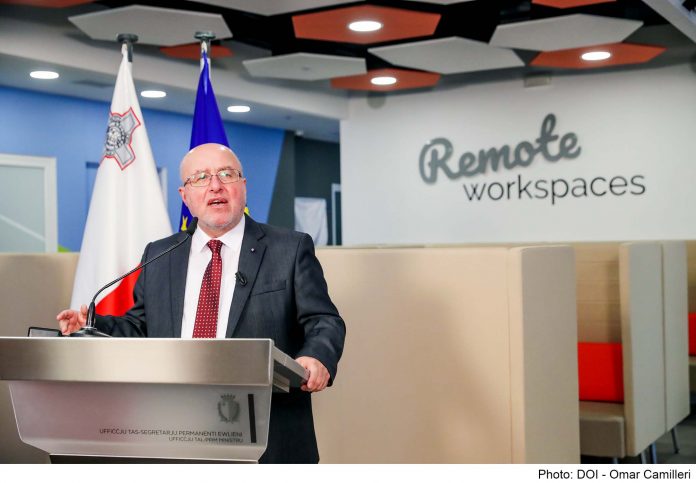
“The studies we carried out clearly show that staff desire to continue working remotely, but not necessarily from home because they still prefer to leave home. By the end of this year, we will have about 15 remote workspace functioning.” – Principal Permanent Secretary Mr Mario Cutajar
The Principal Permanent Secretary, Mr Mario Cutajar, inaugurated the first remote workspaces in the Public Service. The first space is located in Santa Venera for employees within the Ministry for Energy, Enterprise and Sustainable Development. Other Public Service employees may use spaces at servizz.gov hubs in Birkirkara and Qormi, as well as at the Central Office of servizz.gov in Mosta.
Mr Cutajar said that these are the first remote workspaces to be launched in the Public Service but certainly will not be the last. These facilities are not only convenient and comfortable, but it is simple to book spaces in them, and they are equipped with the best technology.
The Head of the Public Service said that all of this is part of a broader Public Service strategy that enters into force in 2022—a strategy in which Public Service employees are a key pillar alongside technology and a high level of service. Mr Cutajar said he is convinced that, from the point of view of human resources, these new practices would also make the Public Service much more competitive.
The Principal Permanent Secretary said that these remote workspaces are the result of studies, a pilot project, and experiences that started before the outbreak of the coronavirus pandemic and from which we learned to shape the strategy. He explained how, in the pandemic, the Public Service remained the only machine functioning in the country and managed to turn difficult circumstances into opportunities, using the experience gained with teleworking to move towards the modern concept of remote working offering new family-work balances. Telework means that individuals work from home. On the other hand, with remote working, employees work from wherever they want, not necessarily from home, with this concept applying to different sections and entire departments.
Mr Cutajar said that this could not have been done if the Public Service did not have the courage to invest 150 million euros in technology in recent years, arming officials with laptops and plug-and-play devices that greatly increased flexibility. By analysing what took place during the first phase of the pandemic, the Public Service found that this flexibility has led to an increase in the motivation of employees working from their homes. There were positive effects on traffic and the environment, employees won time, and productivity has increased. It is an obligation to preserve and strengthen these effects because the Public Service has clear obligations towards society, said Mr Cutajar.
He announced that the Public Service is working on the design of a new policy to regulate remote working and tackle a number of aspects. This is to keep the service at the highest levels of excellence. Above all, the Institute for Public Services is to provide specific training for all workers who will work remotely, as well as management.
The Permanent Secretary at the Ministry of Energy, Enterprise and Sustainable Development, Mr Anthony Gatt, also spoke at the event. He said that apart from this remote working project, the Ministry is working on a pilot project for an e-filing system, delivering a much larger paperless office project, and digitisation of the “fleet management system”. He said that this is being done to continue the effectiveness and efficiency of employees. He thanked workers in the Ministry and the Principal Permanent Secretary for their commitment to make this dream a reality.









